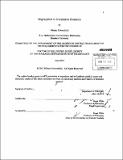Imprecision in normative domains
Author(s)
Schoenfield, Miriam
DownloadFull printable version (6.231Mb)
Other Contributors
Massachusetts Institute of Technology. Dept. of Linguistics and Philosophy.
Advisor
Roger White.
Terms of use
Metadata
Show full item recordAbstract
Being rational and being moral can be difficult. However, some theories of rationality and morality make living up to these ideals too difficult by imposing requirements which are excessively rigid. In this dissertation, I defend and explore the implications of relaxing some of these requirements. I first consider the implications of thinking that rational agents' doxastic attitudes can be represented by imprecise, rather than precise probabilities. In defending this position, I develop a distinction between an idealized, and less idealized notion of rationality. I then explore the moral implications of the thought that facts about value cannot be represented by a precise value function. Finally, I defend permissivism, the view that sometimes there is more than one doxastic attitude that it is rationally permissible to adopt given a particular body of evidence, and show that this view has some interesting implications for questions about higher order evidence.
Description
Thesis (Ph. D. in Philosophy)--Massachusetts Institute of Technology, Dept. of Linguistics and Philosophy, 2012. Cataloged from PDF version of thesis. Includes bibliographical references.
Date issued
2012Department
Massachusetts Institute of Technology. Department of Linguistics and PhilosophyPublisher
Massachusetts Institute of Technology
Keywords
Linguistics and Philosophy.